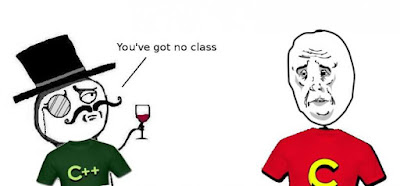Sometimes it is easy to understand another programming if you are too good at one.
1) Class in C++ vs Structure in C
- What is a class in C++? It is nothing but a structure in C with security. Below link will explain better.
https://www.geeksforgeeks.org/structure-vs-class-in-cpp/
- A class cannot contain itself as a member in C++, but a class with pointer can be the member to itself. Structure can contain itself as a member in C.
class Shirley { char arr[] name; Shirley s; // Invalid in C++ };
struct Shirley { char arr[] name; Shirley s; //Valid in C };
- By default, all class members are private in C++ class whereas C structure members don't have this security.
- Template type parameter can be declared with class.
2) Structures in C++
- The default access specifier for the members of the struct is public.
- C++ structures can have constructors, private member functions. But, C structures don't have these.
- Private member variables/functions can be declared before or after the public member variables/functions in C++.
- Template type parameter can't be declared with struct keyword.
3) There are so many syntax differences like below:
printf(""); cout << "";
\n endl
NULL nullptr
free delete <ptr> or delete [] <ptr>
malloc() new
4) There is no format specifiers in C++ so getting rid of another range issues.
5) There is no user-defined initialisation function in C++, but we can have the constructor and destructor in C++. Initialisation functions are automated in C++ with the use of constructor & destructors.
6) Addition of two structures is not possible though it is legitimate in C. But, this shortcoming is addressed in C++ with the help of operator overloading.
8) C++ is an expressive language with the use of abstractions and classes.
int depth = 10; // = expression int depth(10); // (expression list) int depth{10}; // {initialiser list}
Limitations of C++ in Embedded
My personal opinion is If you want to try to control the language than not the language controls you, then always C is the ideal choice.
a) C++ is not closer to portable assembly language.
b) More Memory Consumption:
Predefined heap allocated memory using vectors can kill the embedded application if used in any critical data structure. Most modern C++ programs ignores this arena.
Memory can get bloated through the excessive use of virtual, certian template usage and inline by the bad programmers.
c) C++ can't adopted to fit in other frameworks. It lags in portability.
d)
Will be kept updated...


Comments
Post a Comment